Local police chief assassinated in Iran's restive southeast
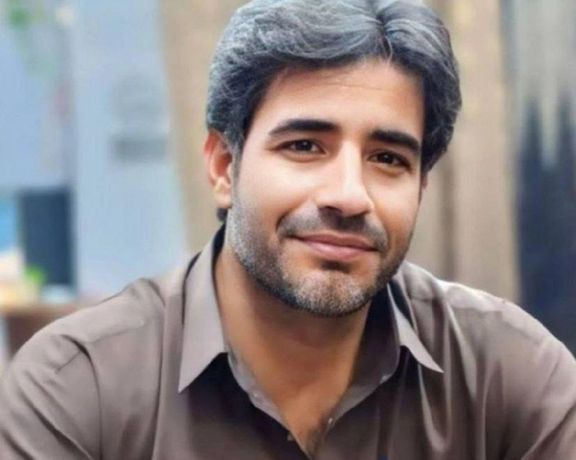
A senior police officer in Iran’s restive Sistan-Baluchestan province was killed by unknown assailants near his house on Friday, IRGC-affiliated Tasnim News reported.

A senior police officer in Iran’s restive Sistan-Baluchestan province was killed by unknown assailants near his house on Friday, IRGC-affiliated Tasnim News reported.
The Sunni Islamist militant group Jaish ul-Adl has claimed responsibility for the assassination of Hossein Piri, a deputy chief of Public Security Police Department of Khash.
The group has a history of carrying out such attacks in Sistan-Baluchestan, including ambushes and bombings, killing dozens of Iranian civilians and armed personnel. Both Iran and the US, as well as some international bodies, have designated Jaish ul-Adl as a terrorist organization
The Friday assassination seems to follow a familiar pattern where local officials are targeted in ‘revenge’ for ‘brutalizing residents.’
The officer killed Friday, Piri, is said to have been “involved in harassing, abusing, and violently arresting” people in the area, according to a report by Haalvsh, a local organization focused on human rights abuses in Sistan- Baluchestan.
“Piri had raided a residential home in… Khash, where he violently arrested two Baloch citizens, while also shooting and using offensive language,” Haalvsh quoted an unnamed source. “He was targeted and shot by armed individuals after leaving his home… and was killed.”
Abdolghaffar Naghshbandi, a former Friday prayers leader in Rask, alleged that Piri's agents had "killed" two Baloch women a few days ago. "This is how the cost of assaulting women across Iran is paid," he tweeted shortly after the assassination.
According to Tasnim, Piri was killed after attending Friday prayers on a mission in plainclothes. “An investigation has been launched into his killing,” Sistan-Baluchestan prosecutor said Friday.
Sistan-Baluchestan is located in southeastern Iran, bordering both Afghanistan and Pakistan. It is one of Iran’s more deprived and brutalized provinces where the Sunni majority suffers persistent human rights abuses, including extrajudicial killings, arbitrary arrests, and religious discrimination.
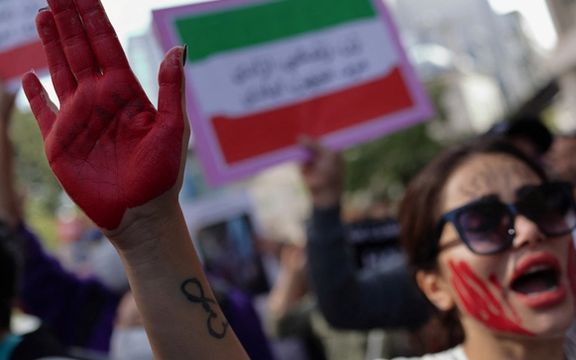
The UN Committee on the Elimination of Racial Discrimination (CERD) has raised concerns about ethnic and ethno-religious minorities in Iran facing disproportionate detentions and death sentences.
The statement released on Friday called on Iran “to review its legal framework, repeal vaguely worded criminal offenses punishable by death, ensure fair and due process for minority groups, and establish a moratorium on the death penalty with the goal of abolishing it.”
The Committee also expressed concern over reports of “grave human rights violations and abuses committed by law enforcement officers” against ethnic and ethno-religious minority protestors during the November 2019, July 2021, and September 2022 protests, particularly in regions with high minority populations. It called on Iran to conduct impartial investigations into these allegations and to provide reparations for the victims.
Amidst growing repression, rights groups warn that ethnic and religious minorities in Iran, particularly the Kurdish and Baluch communities, are facing escalating challenges, with the Islamic Republic's actions being the root cause of their misery.
Iran's leading Sunni cleric, Mowlavi Abdolhamid, voiced sharp criticism on Friday against the ruling establishment for its persecution of religious minorities. He emphasized that the pursuit of justice is the people's paramount demand and urged the immediate release of political prisoners in Iran.
The outspoken Friday Imam of Sistan-Baluchestan Province stands as a prominent advocate for minority rights in Iran.
In Sistan-Baluchistan, a Sunni-majority Baluch province, the community has faced the highest execution rate in Iran over the past 44 years.
Last year, the former UN Special Rapporteur for Iran described the levels of killings, torture, and brutality against the Baluch minority as “shocking.”
Javaid Rehman reported that since the onset of the “Woman, Life, Freedom” protests, more than half of those killed were from Baluch and Kurdish provinces, with 63% of child victims hailing from these regions.
The protests were sparked by the death of a 22-year-old Kurdish-Iranian woman in Tehran while in the custody of the morality police. The authorities carried out a harsh crackdown that resulted in the deaths of approximately 550 individuals and the arrest of over 20,000 others, which was condemned as a crime against humanity by a UN fact-finding mission.
Rehman highlighted the disproportionate targeting and execution of Baluchis, who make up only 2-6% of Iran's population but account for 30% of executions. He also noted that security forces have targeted them extrajudicially, with at least 90 extrajudicial killings, including 22 fuel carriers, in the first nine months of 2023.
Amnesty International reports that Iran has the highest execution rate after China.
The former UN Special Rapporteur stated that Baluchis are “systematically undermined,” left in poverty, and politically, economically, and socially disempowered, calling this treatment a “systematic state policy.”
Amidst the diverse tapestry of Iran's ethnic groups, the Kurds stand as another minority deeply impacted by systemic discrimination. According to Amnesty International, Kurds in Iran have long endured the repression of their social, political, and cultural rights. Kurdish activists are frequently subjected to arbitrary arrests, prosecution, and torture, facing grossly unfair trials in Revolutionary Courts, often culminating in death sentences.
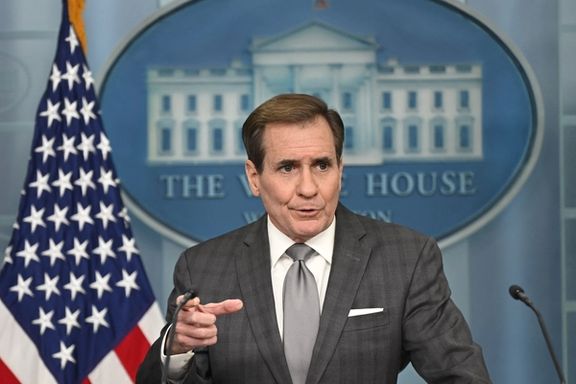
The US believes Iran is still prepared to do something if they choose to, White House national security spokesman John Kirby told reporters on Friday, referring to Iran's promised attack against Israel.
"The US continues to monitor Iran, and is not taking anything for granted," Kirby added.
Kirby's comments came shortly after a phone call between US Secretary of Defense Lloyd Austin and his Israeli counterpart Yoav Gallant, during which they discussed "continued exchanges of fire on the Israel-Lebanon border and the risk of escalation from Iran, Lebanese Hezbollah, and Iran-backed terrorist groups across the Middle East.
"I confirmed the US commitment to Israel’s security and shared that the US is well postured across the region to defend Israel and protect US personnel and facilities," Austin said in a Friday tweet about his Thursday conversation with Gallant.
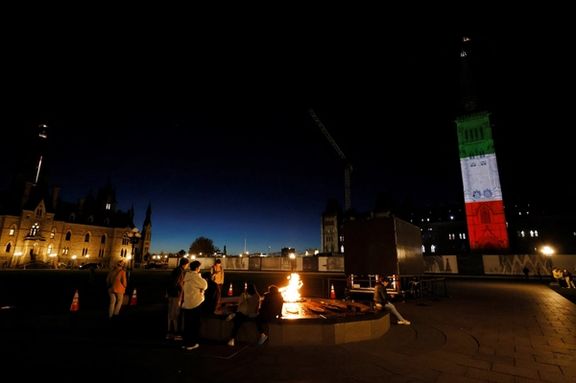
A grassroots coalition of lawyers and concerned Iranians in Canada is urging the public to share any information they may have about individuals connected to the Islamic Revolutionary Guard Corps (IRGC) and the Islamic Republic.
This appeal follows Canada's official designation of Iran's Revolutionary Guard as a "terrorist entity" in June, underscoring the government's responsibility to act against such threats.
Established in 2022, StopIRGC is a British Columbia-based organization led by Iranian-Canadian lawyers and volunteers dedicated to investigating and identifying potential activities associated with the IRGC. Since the death of Mahsa Amini in the custody of Tehran's morality police in September 2022, the coalition has taken on the task of tracking the Islamic Republic’s agents operating on Canadian soil. These agents are believed to spy on Iranian diaspora activists and engage in activities such as money laundering and sanctions evasion.
In response to persistent appeals from the Iranian diaspora to bar regime-affiliated officials from entering Canada—particularly following the Iranian authorities' brutal crackdown on the nationwide "Woman, Life, Freedom" protests in 2022—the Canadian government has begun deporting individuals linked to the establishment. In July, reports emerged that Canadian immigration authorities had initiated deportation proceedings against five suspected senior Iranian government officials residing in the country. The Canada Border Services Agency (CBSA) has alleged that these individuals held senior positions within Iran’s government and has requested the Immigration and Refugee Board (IRB) to conduct hearings on their cases, as reported by Global News.
Although the Trudeau government imposed sanctions in November 2022 to bar individuals connected to the Iranian state from entering Canada, the first deportation order was issued in February 2024. According to Global News, this policy has already resulted in deportation orders against Majid Iranmanesh, a former science advisor, and Seyed Salman Samani, a former deputy interior minister.
Nevertheless, the influence of the Islamic Republic extends beyond the Iranian diaspora, encompassing anti-Israeli activities as well. In early August, Iran International exclusively reported that Iran was orchestrating anti-Israel protests at a Canadian university, aiming to weaken Western support for Israel and sow division within Canada.
Furthermore, in its annual report released in May, the Canadian Security Intelligence Service (CSIS) highlighted cyber-attacks originating from the Islamic Republic, specifically targeting Canada. A separate report on foreign interference, also published in May, identified Iran, alongside China, Russia, India, and Pakistan, as key threats to Canadian national security.
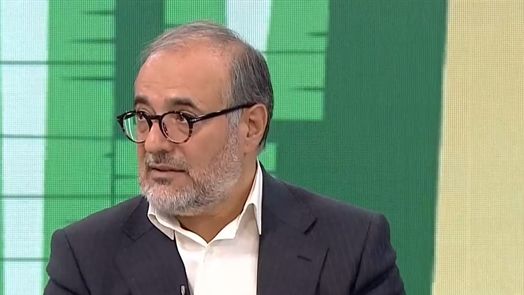
In an unprecedented development, the chairman of Iran National Development Fund has called on President Masoud Pezeshkian to re-establish US consular services at the venue of former American embassy in Tehran.
Mehdi Ghazanfari, appointed by former hardline president Ebrahim Raisi, addressed Pezeshkian in a tweet, saying, "It would be good, at the very least, to restore consular services at the US Embassy in Tehran out of respect for the Iranian people, so that the many Iranians there can travel more easily."
"Now that all the pillars of the regime are supporting you and your government, please, if you see fit, implement a few tasks that have been left unfinished for many years. It might be better to do these before the honeymoon period ends."
In 1979, a few months after the establishment of the Islamic Republic, a group labeled as student supporters of Ayatollah Ruhollah Khomeini attacked the US embassy in Tehran and took dozens of Americans hostage for 444 days. They were release in January 1981, the day when President Ronald Regan was taking his oath of office. US and Iran have severed diplomatic relation for the past 44 years.
The National Development Fund (NDF) is Iran’s sovereign wealth fund and Ghazanfari is considered a high-level government official. Most of the fund, estimated to be around $100 billion has been drained in the past five years because of the impact of US sanctions.
Ghazanfari began his message to Pezeshkian by saying, "Now that all the pillars of the regime are supporting you and your government, please, if you see fit, implement a few tasks that have been left unfinished for many years. It might be better to do these before the honeymoon period ends."
He went on to say that the students who took over the embassy were most probably linked to the Iran’s Communist Tudeh Party. “They threw a rock into the well, which no one has been able to retrieve so far,” Ghaznfari said.
It is difficult to determine if Ghazanfari was expressing his personal opinion, or his tweet was an effort by the government or a certain faction to raise the issue of re-establishing ties with the United States.
An Iranian analyst, who wants to remain anonymous, told Iran International that if the government orchestrated Ghazanfari’s comments, the aim might have been to raise the issue and initiate a national conversation, using an economic figure to break the ice rather than a political official.
The analyst further noted that reactions in Tehran to Ghazanfari's remarks could indicate whether the government was involved. If Supreme Leader Ali Khamenei or President Pezeshkian swiftly dismiss or condemn his statement, it would suggest that the policy at the top remains unchanged.
Amid unsurmountable economic crisis, there have been some signals in the past two months that Tehran might be open to improving relations with the West. The specter of Donald Trump’s re-election has made the Islamic Republic more nervous about harder times ahead. The Biden administration has been softer on Tehran, allowing breach of sanctions and releasing $16 billion of frozen funds.
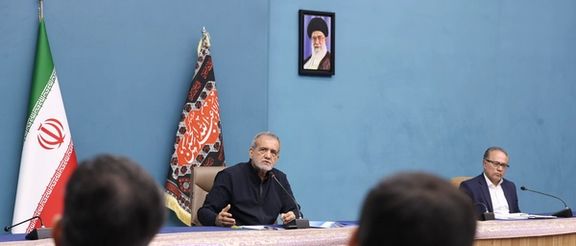
Masoud Pezeshkian is the first Iranian president to publicly acknowledge that his ministers were either chosen or approved by the Supreme Leader. Some argue this was a clever move to underscore Ali Khamenei’s accountability.
In his final address to the Parliament, before his cabinet was put to vote, Pezeshkian stressed that Khamenei had not only approved every proposed minister but had also personally urged at least one reluctant candidate to join.
He insisted that every single minister had been vetted by the Intelligence Ministry and the Intelligence Organization of the Revolutionary Guards and could get a vote of confidence for two of his most controversial ministers, the 'reformist' Mohammad-Reza Zafarghandi and Ahmad Meydari, without much trouble. The final vote count was a serious blow to the ultra-hardliners who had supported Saeed Jalili in the elections.
Many interpret Pezeshkian’s remarks as a deliberate surrender of presidential authority, reducing himself to a mere executor of Khamenei’s policies and orders. Critics have labeled him the "first minister" for Khamenei, arguing that he has undermined the constitutional powers granted to the presidency.
Hamid Aboutalebi, a former diplomat and adviser to Hassan Rouhani in a tweet described Pezeshkian’s situation as winning the “battle” with the Parliament and losing the “war” to uphold “constitutionalism” and the “republic”.
However, some pundits and supporters believe that Pezeshkian’s candid admission of “coordinating” everything with Khamenei might be part of a larger strategy. They argue that by openly involving the Supreme Leader, Pezeshkian ensures that Khamenei will share the burden of criticism if the ministers fail to address the country’s critical situation.
An observer in Tehran also told Iran International, “He outmaneuvered the ultra-hardliners by using their own tactics against them. Hardliners have long accused their political opponents of defying Khamenei’s wishes to discredit them. With his shrewd speech, Pezeshkian turned the tables, putting Paydari Party lawmakers and their allies in the very position they’ve often used to attack others.”
“Ultra-hardliner’s opposition to his ‘national accord government’ and ministers who come from various political factions, with Khamenei’s full blessing as he claimed, would only mean defying or undermining Khamenei,” he added.
Netizens have also widely taken to X and other social media platforms to comment in favor or against Pezeshkian’s unprecedented public disclosure of the extent of Khamenei’s role in administrative affairs.
“It’s not fair that the Leader always interferes in the selection of ministers and the head of the government is blamed for their possible failures,” one of the tweets in support of Pezeshkian’s move read. “Pezeshkian has put pressure on parallel [state] institutions with this move to cooperate with the administration rather than pushing cogs in the government’s wheel as they did to Rouhani’s government,” the X user added.
Another netizen surmised that Pezeshkian’s move could also help prevent military bodies from “throwing spanners in his works”. “And everyone thinks he is saying these things naively,” the netizen remarked.
Some have also described Pezeshkian’s seemingly impromptu remarks as “clever”. “We think that Pezeshkian is an idiot because of the way he behaves. But this guy knows how to kill without injuring,” another tweet argued.
Others have commented that Khamenei’s tacit support which Pezeshkian tried to bring to light has been imposed on him by “special and unique circumstances of the country” including the perceived danger to his authority from ultra-hardliners who declare obedience to him but have secret plans for his succession.